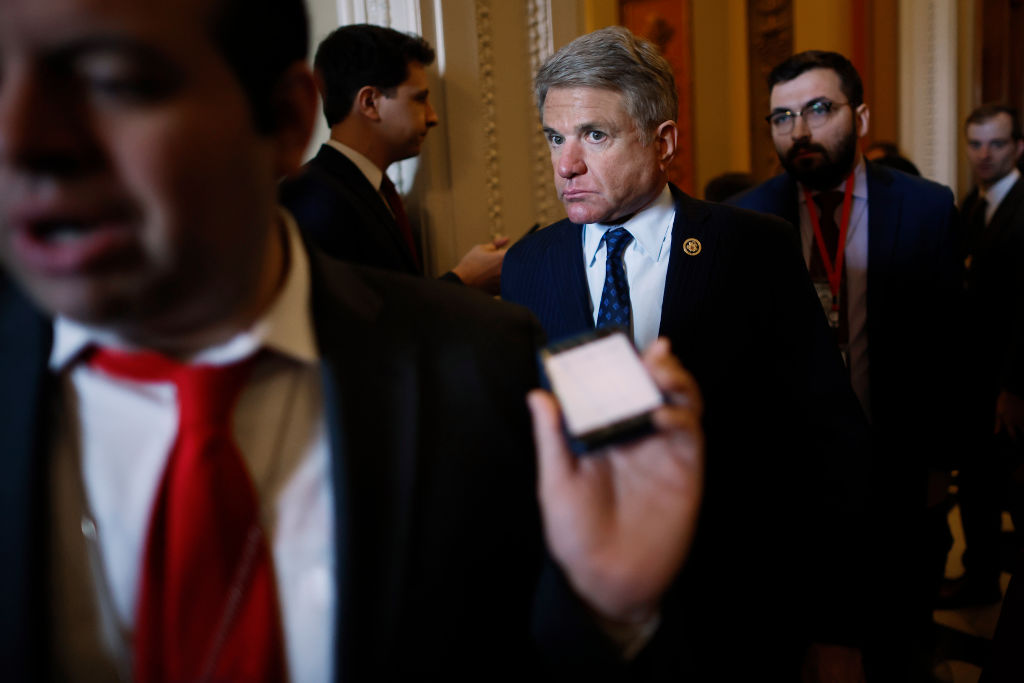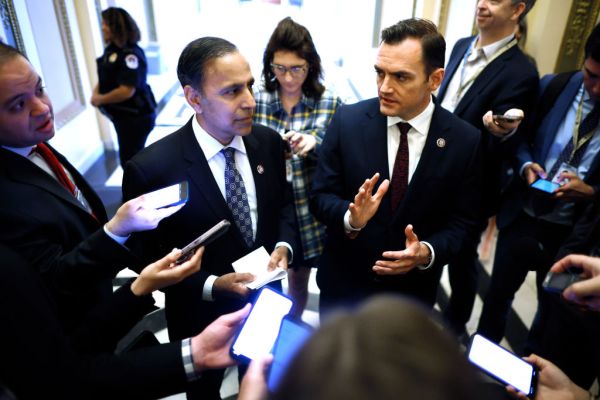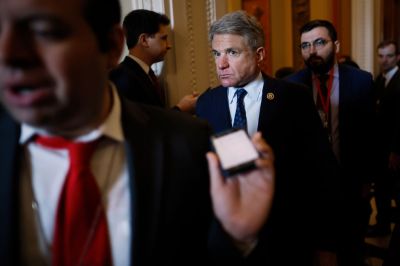President Donald Trump left no doubt regarding his about-face on banning TikTok when he invited the social media app’s CEO to his inauguration, where Shou Zi Chew sat next to the nominee for director of national intelligence, Tulsi Gabbard, in the Capitol Rotunda.
Hours after the ceremony, Trump signed an executive order that put a law ordering the app’s sale or shutdown by January 19 on pause, instructing the attorney general not to take action to enforce it for 75 days. Now, congressional Republicans who backed the bipartisan legislation seem willing to give Trump a little leeway with his extension—even if they don’t think it is quite in line with the law.
GOP members of both chambers weren’t willing to say outright that Trump contradicted the law that will ban the social media app if its Chinese-owned parent company, ByteDance, does not divest from it. But most who spoke to The Dispatch this week made the case that the president’s actions are following the law’s intent.
“There is some legal debate over that,” Rep. Michael McCaul of Texas—who sponsored the bill that eventually was enacted—said when asked whether Trump’s executive order agreed with the law. “We have a law that I got passed. The Supreme Court upheld it. He’s using his executive powers to delay enforcement, pending a negotiated resolution to the matter. So, if he can facilitate a deal where the intent of the statute’s carried out—and that is, a divestment of ByteDance to an American company—then I think we achieve the result we want.”
Signed into law by Joe Biden in April, the bill designed to protect national security interests—and app users’ personal data from Chinese access—was included in a foreign aid package to help Ukraine, Israel, and Taiwan. Even before the law took effect Sunday, it had withstood a Supreme Court challenge, and Biden had announced he wouldn’t implement it by fining companies such as Apple and Google that might allow access to the app. That left the matter to the incoming administration.
After a brief shutdown of the app over the weekend, Trump promised to give TikTok an extension, which led it to resume functional operations, although the app is no longer available in Google and Apple app stores. In the order, Trump argued that the fact that the law’s effective date fell right before his taking office “interferes with my ability to assess the national security and foreign policy implications of the Act’s prohibitions before they take effect” and promised to consult with his advisers and the leaders of executive agencies “to pursue a resolution that protects national security while saving a platform used by 170 million Americans.”
The law empowers the president to provide a one-time extension of up to 90 days, but with an important condition: He must certify to Congress that there are binding legal documents in place to execute a divestment that would satisfy the law. Such a deal hasn’t emerged. What’s more, Trump did not exactly invoke that power; he just directed his Department of Justice not to enforce the ban. That leaves congressional Republicans facing the conundrum of whether to challenge the authority of a president who is notorious for changing his mind (especially on this issue) or go along with it. GOP senators and congressmen say they will take the latter option, even if the extension isn’t strictly what the law dictates.
“I think it’s within the spirit of the law,” Sen. Kevin Cramer of North Dakota told The Dispatch. “If anybody wants to litigate against it, they can, and we’ll see what courts would do, but I do think it’s within the spirit of the law.”
And clearly, Republicans are putting their confidence in the president’s dealmaking abilities.
“If the new president, who is much more of a dealmaker than the previous one, obviously—if he thinks he can put something together, some sort of an acquisition by an American company or a group of American entrepreneurs and keep TikTok alive, I think he should be given the 75 days to do it,” Cramer told reporters.
Michigan Rep. John Moolenaar, who chairs the House’s Select Committee on the Chinese Communist Party, made similar comments.
“There’s an opportunity to come to a deal that would make TikTok divest from ByteDance so that it could continue as accessible to the American public,” he told The Dispatch. “Ultimately, the Chinese need to come to the table and negotiate, or it will end here in the United States. President Trump came in at a time where there’s a lot happening around the world, and I believe he’s going to make the good-faith effort—and he's a great dealmaker—and hopefully we’ll have an opportunity to see an Americanized version that would keep people’s data safe.”
Still, not all Republicans in Congress are so deferential. Sen. Bill Cassidy of Louisiana told NOTUS that “if Congress has passed a law, I think the law has to be enforced.” Likewise, Rep. Carlos Giménez of Florida, who sits on the House’s China committee, made it clear he thinks Trump should follow the law. Although he said he would leave it to Trump for the 75 days, he was emphatic that the president must see that the law’s requirements are met, one way or another.
“I’m going to give him time, but at the end of the day, we have to comply with the law,” he told The Dispatch. “I certainly support the law. I voted for it. China represents an existential threat to the United States, and TikTok is an arm of China. And so, I want TikTok to be banned, or they’re sold to an American company.”







Please note that we at The Dispatch hold ourselves, our work, and our commenters to a higher standard than other places on the internet. We welcome comments that foster genuine debate or discussion—including comments critical of us or our work—but responses that include ad hominem attacks on fellow Dispatch members or are intended to stoke fear and anger may be moderated.
With your membership, you only have the ability to comment on The Morning Dispatch articles. Consider upgrading to join the conversation everywhere.